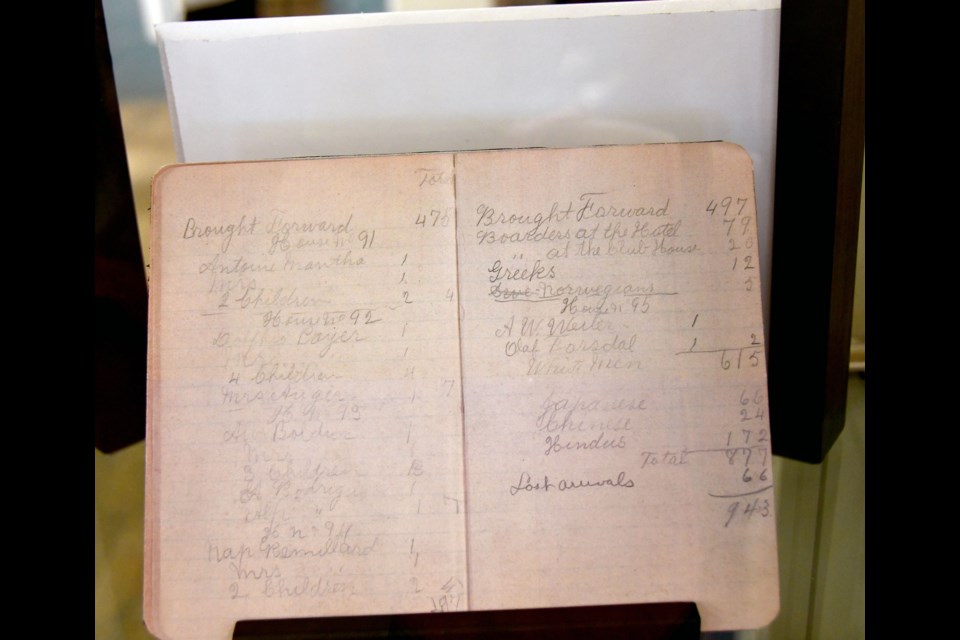They have no names.
In the 1910 census for Fraser Mills, a sawmill community south of the Coquitlam neighbourhood of Maillardville, the labourers are tallied according to their ethnicities:
- Japanese, 66
- Chinese, 24
- Hindus, 172
At the time, they totalled at least 200 more than the White men working and living on the site, but, because of the Anti-Oriental riots of 1907 in Vancouver, the Asian numbers at Fraser Mills were dwindling in favour of Québecois employees.
The written head count from that era is now on display in a new Coquitlam Heritage Society exhibit called The 1923 Chinese Exclusion Act. The exhibit is up until Sept. 29 at the City Centre branch of the Coquitlam Public Library (1169 Pinetree Way).
Timed to coincide with the 100th anniversary of the federal legislation — and to bring light to the anti-immigration attitudes at Fraser Mills — the show is an acknowledgwment of Chinese emigrants who were impacted by racism at the turn of the century.
Markus Fahrner, Coquitlam Heritage's exhibits manager, along with UBC history undergraduate Colton Enslen, curated the exhibit after seeing a national commemorative exhibition, called The Paper Trail to the 1923 Chinese Exclusion Act, by Catherine Clement, at the Chinese Canadian Museum in Vancouver.
That show features hundreds of identity documents issued by the Dominion of Canada that were used to track Chinese–Canadians during the Chinese Immigration Act.
The documents were a reminder to the owner of their second-class status in Canada.
Fahrner got permission from six Coquitlam families whose ancestors' certificates are part of The Paper Trail collection at the UBC Library to reproduce them for the library show:
- Hoo Chow
- Rohda Chow
- Rose Chow
- Suey Ying Chung
- Bing Tong Wong
- Lan Sin Wong
As well, he gathered information from a man named Albert, who has family living in Coquitlam, about how his great-grandfather and grandfather suffered while living in Canada.
The great-grandfather, a railway worker, paid for his son's head tax to come to Canada, but Albert's grandfather returned to China when the Canadian government repeatedly denied entry for his wife.
During the Second World War, when many Chinese–Canadians were torn about fighting for a country with discriminatory policies, Canada also made it difficult for Chinese immigrants to send money back home.
With so much tension and so few Chinese women in the Lower Mainland, the Chinese men in the Lower Mainland bonded through organizations like the Bachelor Society whose mission was to support each other.
"They were treated like 'things' by Canada. It was pure hate," Fahrner told the Tri-City News Thursday (Aug. 24) as the exhibit was being installed at the City Centre branch.
"The Bachelor Society shows these guys were tough. They were resilient despite being demonized. They created their own community."
Besides the stories and identification cards, the exhibit also highlights items from the Coquitlam Heritage collection that were regularly used by Chinese–Canadians such as railway materials, a tea cup, a mah jong set, musical instruments and an abacus.
As well, the panels are written in English and Cantonese.
"I want to do this more with our multicultural exhibits," Fahrner said. "It's essential….It makes for true inclusion in our society today."
Coquitlam Heritage will host a curator’s talk on Sept. 14, 2023, from noon to 5 p.m. at the City Centre branch (1169 Pinetree Way). You can visit the society's website for more.





